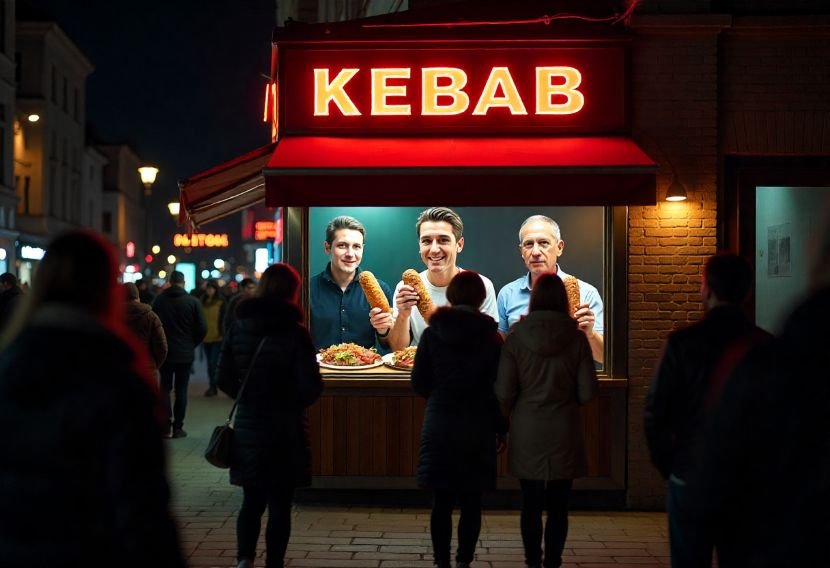AI in Travel
Tourist Scam Warning: AI Celebrity Endorsements Fool Istanbul Visitors, Here Is What All You Need To Know

Wednesday, July 23, 2025
On vacations abroad, particularly in pulsating cities as Istanbul is, tourists rely on visual cues to decide about their dining options. But one family of unsuspecting tourists were recently given a quite different story when they visited the Turkish city of Istanbul, after being pranked by an advanced AI at a local kebab shop. When looking for a place to eat, they came across a garish digital advertising signboard with hyper realistic pictures of people like David Beckham, Dwayne Johnson, Mark Zuckerberg and rap artist Snoop Dogg cheerfully promoting the modest eating joint.
At first excited at the prospect of eating in a place that they had heard international stars had patronized, the prospect became suspicious. On close examination, the visitors discovered a tiny disclaimer tag, “Imagined by AI,” that disclosed these endorsements as being digitally invented and completely fictional.
What this incident suggests is a growing risk for a common concern that affects tourists around the world: advanced AI solutions can now develop falsified and highly believable images, endorsements, and the like and can sway travelers’ decision-making processes in the worst ways. When scams are well executed like this, they mislead victims into thinking they are reputable businesses, thereby harming victims’ trust in legitimate businesses and negatively impacting a legitimate business’ reputation.
The Expanding Impact of AI-Generated Scams on Travel
AI-generated deception isn’t limited to celebrity endorsements. Travelers worldwide report increasing encounters with sophisticated scams powered by artificial intelligence. Government tourism advisory boards in Australia, the UK, and the USA now actively warn travelers about AI-crafted online scams targeting vacationers. Common tactics include fake hotel booking websites, misleading travel deals offered by automated chatbots, and artificially-generated hotel or restaurant reviews.
One alarming case from Vietnam involved tourists arriving at a supposed eco-friendly lodge advertised online, only to find a basic shed, not the lush accommodations digitally depicted. In Bali, Australian travelers flagged villa advertisements featuring surreal architecture and bizarre visual inaccuracies—clear indicators of AI manipulation.
For the travel industry, particularly business travelers, the growing prevalence of AI scams poses substantial risks. Businesses that depend on travel agencies and online reviews could inadvertently rely on deceptive information, causing disruptions, financial losses, and safety concerns.
Official Travel Safety Advice from Government Sources
Authorities, including the U.S. State Department and Australia’s Smartraveller program, strongly recommend travelers take additional precautions to avoid AI scams:
- Always verify travel deals and bookings directly through official hotel and airline websites rather than relying solely on third-party sources or promotional emails.
- Cross-reference reviews across multiple reputable platforms to confirm authenticity. Independent review forums and trusted social media sources are recommended.
- Avoid engaging with suspicious chatbots offering overly attractive deals; these are often designed solely to obtain sensitive financial information.
- Never provide personal or financial details via unsolicited emails or messages.
Quick Tips for Travelers and Business Professionals
To navigate the complex digital landscape safely, travelers—especially business professionals—should:
- Inspect images closely for anomalies or unnatural features, like distorted fingers, irregular backgrounds, or odd reflections.
- Confirm accommodations directly by contacting the property to verify all amenities and ensure images match real offerings.
- Report suspicious activity to local tourism boards or authorities promptly to assist others in avoiding similar scams.
Additional Information for Istanbul Tourists
For travelers planning to explore Istanbul, it’s important to note that authentic restaurants and popular eateries rarely rely solely on celebrity endorsements. Instead, genuine local hotspots often have numerous credible reviews across platforms like Tripadvisor, Google Maps, or even recommendations from locals.
Tourists should consider checking with the official tourism websites of Istanbul and Turkey’s Ministry of Culture and Tourism to access verified lists of reputable businesses and attractions. Travelers can also visit visitor centers to receive trustworthy information and prevent falling victim to misleading advertisements.
Future Implications and Staying Vigilant
And as AI keeps gaining ground, the number and sophistication of digital deceptions aimed at tourists and business travelers is likely to rise. It is important for leisure and business travellers to stay aware and to stay safe, and increasingly that means improving digital reading to spot and avoid those threats.
For travel and tourism businesses, those that educate their employees about digital scams will be well placed to continue work productively and in a secure manner. Hotels and restaurants need to play an active role in having transparent online teaching, positive reputation based on verified customer reviews and real interactions, thus building trust and minimizing the negative impact on the trust caused by the AI-driven fraud.
At the end of the day, however, surviving in a digital world comes down to being sceptical when you see something too good to be true, too visually-impressive to seem real, or just something you never thought you’d find offered for “free.” A fight over an Istanbul kebab shop is a timely reminder that in the age of artificial intelligence, travelers need to not only read the fine print, but also look closely at each pixel.
Tags: AI deepfake, AI scams, AI-generated images, business travel impact, business traveler tips, celebrity endorsements, digital safety, fake reviews, Istanbul, kebab shop, tourism advice, tourist scams, Travel advisory, travel alerts, travel fraud, travel safety tips, travel scams, Travel Security, Turkey
AI in Travel
When AI Deepfakes Send Tourists Chasing Illusions – Open Jaw
AI in Travel
How many Aussies are using AI to plan travel, who’s utilising it & what exactly are they using it for?

Nearly a third of Aussies are now using artificial intelligence (AI) to help plan their holidays, according to new research from Compare the Market.
In a survey of over 1,000 Australian adults, three in ten (28.8%) respondents said they relied on AI tools to lock in travel deals, scout destinations and find activities.
More than one in ten (11.5%) are specifically using AI for destination recommendations – the most popular use of AI in travel – while a similar number (10.3%) are seeking out deals.
Meanwhile, nearly one in ten (9.4%) look for recreational activities and accommodation, while one in 11 (9%) use AI to create itineraries, and nearly the same number (8.2%) search for flights and transport. A small percentage (3.2%) use AI to understand currency conversion.
“Australians love a good holiday and have never been afraid to ask for help when planning the perfect getaway,” Compare the Market’s Chris Ford says.
“Our latest data highlights a shift in the way travellers are approaching their planning, with convenience, personalisation and speed driving the adoption of innovative AI tools.”
When it comes to who’s using the technology, the survey reveals a clear generational divide.
The study found that, unsurprisingly, Gen Z and Millennials are the most likely to engage with AI when planning a trip.
On the other hand, the vast majority (93%) of Baby Boomers and three-quarters (76%) of Gen Xers said they’ve never used AI tools to help book a holiday.
Interestingly, Gen Z and Gen X lean on AI for destination recommendations, Millennials for recreational activities, and Baby Boomers primarily for accommodation.
Advice, but not an advisor
While AI adoption isn’t surprising, Ford cautions that it should be treated as a tool, not a travel agent – and travellers should always sense-check recommendations.
“It’s likely that travellers are using these tools in addition to chatting with travel agents, conducting desktop research or seeking ideas and inspiration from social media,” he notes.
Despite being a “great starting point” in the overall journey, Ford says that it’s important to “always ensure you’re crossing your ‘t’s and dotting your ‘I’s” when using AI.
“Many of these tools and services are still in their infancy stage and may not be 100% accurate, so do your own research to ensure you’re equipped with the right tools and information for your trip,” he states.
“The last thing we want to see is anyone getting themselves into a potentially dangerous or unsafe situation based on the recommendations from AI.”
With this in mind, Ford also reminds travellers not to overlook insurance.
“Travel insurance is designed to protect you against unexpected events when you’re travelling domestically or internationally and AI may not be forthcoming with these types of incidents,” he says.
“The type of cover offered by insurers can vary, but consider policies that cover scenarios for the kind of holiday you’re booking.”
Where AI “falls short”
Karryon Features Editor Gaya Avery says while AI handles bookings, great travel agents go further — acting as trusted advisors, curators and problem-solvers.
“They don’t just book travel – they shape it, tailoring experiences to each client’s needs. That’s where artificial intelligence falls short,” she said.
“Travel professionals provide value: personalised service, insider knowledge and human connections that AI simply can’t replicate.”
So does high AI uptake mark the death of the travel agent? Get Gaya’s take on the technology from earlier this year here.
AI in Travel
Booking.com Releases The Global AI Sentiment Report

- 91% of global respondents say they are excited about AI and 79% are familiar with the technology, though levels vary across regions.
- Despite widespread enthusiasm, only 6% fully trust AI and the majority (91%) have at least one concern about its implications.
- Only 12% of consumers are comfortable with AI making decisions independently, highlighting a clear boundary when it comes to fully handing over control to automation.
- 89% of consumers want to use AI in future travel planning, with AI assistants (24%) now considered a more trusted source than travel bloggers (19%) or social media influencers (14%).
AMSTERDAM – Today, Booking.com released The Global AI Sentiment Report, drawing on insights from over 37,000 consumers across 33 markets to explore how people are using, trusting, and responding to AI in everyday life and travel. As both the public and private sectors accelerate investments in AI, Booking.com, a leading digital travel platform that has integrated AI into its services for over a decade, is committed to shaping the future of travel technology in line with evolving consumer attitudes.
With excitement around AI at a peak and innovation increasing at rapid pace, Booking.com is harnessing this momentum to redefine how people search for, book, and experience travel, advancing its mission to make it easier for everyone to experience the world. The report reveals a nuanced picture: 91% of consumers express excitement about AI, 79% are familiar with the technology, and 89% want to use AI in their future travel plans. Yet, there are significant regional differences: while some embrace AI’s potential, others approach it with caution, underscoring the need for responsible implementation that balances opportunity with consumer trust. These new insights and perspectives will help shape the next chapter of AI in travel and beyond.
Sentiment Breakdown
Booking.com’s new research identified clear cohorts among global consumers, reflecting diverse AI sentiment: over one-third (36%) identify as AI Enthusiasts, intrigued by AI’s potential, while 13% are AI Advocates, actively championing its benefits and responsible adoption. This enthusiasm is grounded in the belief that AI will make life easier (69%), save time and effort (51%), enhance productivity (40%), and expand learning opportunities (48%).
However, this excitement coexists with significant caution. While 91% express enthusiasm for AI, an equal proportion report at least one concern about its broader implications. Approximately 13% classify themselves as AI Cautious, wary of AI’s development or use, and 9% as AI Skeptics. Notably, one in four respondents (25%) identify as AI Detractors, signaling a meaningful segment resistant to AI adoption.
Mapping the AI Mindset: Regional Variations
Significant regional differences emerge in consumer attitudes toward AI. Latin America (LATAM) leads globally in enthusiasm and familiarity, with 98% of respondents excited about AI and 89% understanding how it works. The Asia Pacific (APAC) region follows closely, showing the highest willingness to integrate AI into daily life-41% use AI for education and the same share for transport.
North America (NORAM) and Europe & Middle East (EME), on the other hand, emerge as skeptical strongholds, approaching AI with more caution and distrust. Globally, while 77% have at least some trust in AI, nearly a quarter (23%) rarely or never trust information generated by it- with distrust highest in these two regions (32% in NORAM and 29% in EME). Consumers here are also more likely to fact-check AI outputs, highlighting a broader demand for transparency and reassurance as adoption grows.
Assistance Over Autonomy
AI has become deeply integrated into daily life, with 98% using AI-powered search, 86% using streaming recommendations, and 77% engaging with generative AI tools. Yet, the lack of a human touch generates doubts with 35% finding AI impersonal, and the majority double-checking AI outputs even when they trust the technology: 42% always fact-check, and 29% do so sometimes. Only 6% of consumers fully trust AI.
This hesitation creates a clear boundary: most people are not ready to cede full decision-making to AI. Just 12% feel comfortable with AI making decisions independently, while 25% remain unsure, and 10% feel very uncomfortable, refusing to trust AI without human approval. The greatest opportunity lies in positioning AI as a supportive tool that enhances, rather than replaces, human judgment.
AI’s Advancing Role in Travel
AI is rapidly becoming a core part of the travel experience, with 65% of consumers expecting autonomous trip planning to go mainstream in the near future. Two in three (67%) have already used AI in some aspect of travel, and of those, nearly all have turned to it for planning or booking (98%) or while already on a trip (96%). This reflects both the growing reliance on AI-powered tools and travelers’ openness to technology that enhances their journeys.
When planning a trip, travelers most often use AI to research destinations and the best time to visit (38%), find local experiences or cultural activities (37%), and get restaurant recommendations (36%). Notably, today, AI assistants are emerging as a more trusted source for planning travel (24%) than colleagues (19%) or influencers (14%).
Once in-trip, AI tools are most commonly used for translation capabilities (45%), in-destination activity suggestions (44%), restaurant recommendations (40%), and navigating unfamiliar locations or transport systems (40%). After returning home, the top AI use case is photo editing, cited by 38% of respondents.
Beyond making travel easier and more efficient, a benefit 66% of travelers recognize, there is also a strong desire for AI to serve as a force for good. The majority (71%) appreciate AI-generated recommendations that help them avoid overcrowded destinations or peak travel times. Travelers are increasingly mindful of community impact, with 60% wanting AI to highlight experiences that positively benefit the local places they visit.
Generative AI represents one of the most significant technological shifts of our era, fundamentally reshaping how consumers engage with the world around them. As this technology matures, it’s not only transforming how companies like ours anticipate and meet evolving customer needs, it’s also raising the bar for what travelers expect from every interaction.
The opportunity ahead is tremendous. At Booking.com, we’ve long been at the forefront of AI innovation, integrating advanced machine learning to enhance the customer journey at every touchpoint. But as we enter this next phase, our responsibility goes beyond technology. Building trust, ensuring transparency, and prioritizing safety are critical as we guide travelers, and our industry, into the future.
James Waters, Chief Business Officer at Booking.com
Booking.com’s The Global AI Sentiment Report can be accessed here.
Methodology:
This global quantitative research study was conducted via an online questionnaire between April and May 2025, gathering responses from 37,325 people across 33 markets. Argentina: 1012, Australia: 1013, Austria: 500, Belgium: 1000, Brazil: 2006, Canada: 1007, China: 2018, Colombia: 1023, Croatia: 509, Denmark: 508, France: 2031, Germany: 2033, Hong Kong: 1006, India: 2004, Ireland: 504, Israel: 505, Italy: 1000, Japan: 1029, Mexico: 2014, Netherlands: 1008, New Zealand: 1015, Portugal: 1013, Singapore: 1002, South Korea: 1006, Spain: 1006, Sweden: 502, Switzerland: 501, Taiwan: 1022, Thailand: 1002, UAE: 513, UK: 2005, USA: 2004, Vietnam: 1004. As a leading digital travel platform exploring the role of AI, Booking.com conducted this study to better understand how people around the world are using, trusting, and responding to AI in both everyday life and travel.
About Booking.com
Part of Booking Holdings Inc. (NASDAQ: BKNG), Booking.com’s mission is to make it easier for everyone to experience the world. By investing in the technology that helps take the friction out of travel, Booking.com’s marketplace seamlessly connects millions of travelers with memorable experiences every day. For more information, follow @bookingcom on social media or visit globalnews.booking.com. For more information, follow @bookingcom on social media or visit globalnews.booking.com.
Press Office Booking.com
+31 20 709 4743
Booking.com
-

 Brand Stories2 days ago
Brand Stories2 days agoBloom Hotels: A Modern Vision of Hospitality Redefining Travel
-

 Brand Stories2 days ago
Brand Stories2 days agoOlive Living: India’s Intelligent, Community-Centric Hospitality Powerhouse
-

 Destinations & Things To Do3 days ago
Destinations & Things To Do3 days agoUntouched Destinations: Stunning Hidden Gems You Must Visit
-

 AI in Travel3 days ago
AI in Travel3 days agoAI Travel Revolution: Must-Have Guide to the Best Experience
-

 Brand Stories3 weeks ago
Brand Stories3 weeks agoVoice AI Startup ElevenLabs Plans to Add Hubs Around the World
-

 Brand Stories2 weeks ago
Brand Stories2 weeks agoHow Elon Musk’s rogue Grok chatbot became a cautionary AI tale
-

 Asia Travel Pulse3 weeks ago
Asia Travel Pulse3 weeks agoLooking For Adventure In Asia? Here Are 7 Epic Destinations You Need To Experience At Least Once – Zee News
-

 AI in Travel3 weeks ago
AI in Travel3 weeks ago‘Will AI take my job?’ A trip to a Beijing fortune-telling bar to see what lies ahead | China
-

 Brand Stories3 weeks ago
Brand Stories3 weeks agoChatGPT — the last of the great romantics
-

 Brand Stories2 weeks ago
Brand Stories2 weeks agoHumans must remain at the heart of the AI story














You must be logged in to post a comment Login